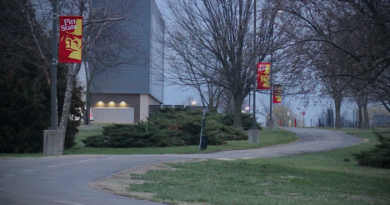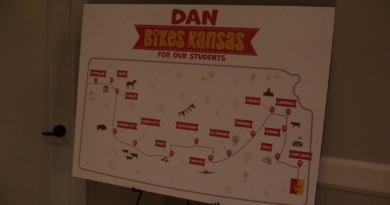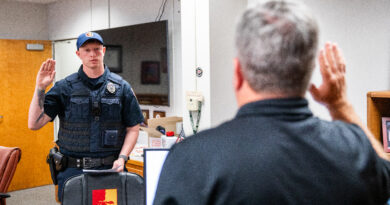Q and A: PSU music student, professor, musician Devon Turner
By Leticia Juang
On a sunny afternoon, I walk through the front door of Pittsburg State University’s McCray Hall. I see the 29-year-old music professor Devon Turner finishing a pizza at one of the big wood tables by my right, but before sitting down with him, I decide to walk around the music building. Not long after that, Turner finds me on the third floor, and we look for a free practice room, since his office was being used by a student at the time.
Turner was in his comfort zone inside that building that was so new to me, which makes sense: Not only does he teach the grand piano at Pitt State, but he is also a graduate student at the organ, knowing how to play the keyboard and harpsichord as well.
We sit beside an upright piano made with lightly colored wood as other instruments sound from other rooms down the hall. It was a very symbolic soundtrack to our conversation that took place moments after the door was closed—one about his relationship with teaching and music itself.
Responses have been edited for length and clarity.
When did you first start to listen to music?
As early as I can remember, I was about 5 or 6 years old—and I grew up in a household where my mom is completely deaf. She can’t hear it all, and I grew up as her interpreter. And for someone who can’t hear music at all, she was always the one that played music.
Is it weird to be a musician and to have a deaf mom?
A little bit, but I can always remember when I was starting at the piano and she wanted to “hear it,” she would just rest her hands on the piano and feel the vibrations. And that was her listening to it.
The nice thing was, no matter how loud I played, she couldn’t hear me. No matter how bad I played, she couldn’t hear me. And to her, it always sounded great, no matter what I did.
How did you get to music classes?
It’s kind of funny, because I was just at home one day with my grandmother, and she liked to watch a lot of historical dramas.
There was one, I think it was about Elizabeth I, but there’s a scene where she’s sitting at a little harpsichord and she’s playing it. And I just vividly remember telling her, “I want to do that. I want to learn to do that.” And she was on board with it.
Where I’m from, in Oklahoma, there wasn’t really anyone nearby that knew how to teach music lessons or anything like that. My great grandmother knew a woman down the road who taught voice and could probably teach me something. So she just took me there for piano lessons one day, and I immediately got attached to it. Every week for six months, my great grandmother would always take me to piano lessons before my grandmother started taking me.
And how old were you when you started having classes?
I started at 11 years old.
What made you say, “okay, this is what I’m doing for life?”
Surprisingly, before music, I wanted to be a forensic scientist. I don’t know at what point it clicked, but I just wanted to take piano because I just wanted to have the fun of playing piano. And then, after a moment, it was really, “I think this is what I want to do. I want to do music.”
How did you get to be a music professor?
My first year of college, I wanted to actually be a composer. I went to a private university before here. I got an email from the composition teacher that said “Well, if you don’t make it as a composer, you can be a coffee barista for $10 an hour.” I thought, “Well, you know, I’m paying a lot of money to go here. That’s not something I really want to hear.” So I kind of dropped the whole composition thing.
It wasn’t until I transferred here for my undergrad that I had the opportunity to actually give private lessons, and I just found so much more enjoyment in actually teaching it. And then when I went to my first grad school in Montreal, they put me in a position to teach piano. I got to teach freshmen and sophomore non-keyboard majors how to play the keyboard and stuff, and I just found that to be so much more rewarding.
It’s just so much fun getting to moments in teaching where the student goes, “yeah, I get it, I can do this,” and then it falls back reward-wise on it. I caused that success, and now I’m here and I’m teaching more, and I love it. I just can’t think of a moment where I would want to do anything else, and all it took was a composition teacher telling me I can make $10 an hour making coffee.
You also know a lot of music stories, and you’re always telling them during classes. How did you first start to learn them?
It probably goes back to my interaction with that scene of Elizabeth I playing at the little harpsichord. And I don’t know what brought it on, but I just wanted to learn more, and more, and more, and more about it.
My mother and I lived with our grandparents, so I was home a lot, and I just had unlimited access to look up all these different sorts of music history topics that would have never come along. Then my grandmother would take me to the bookstore, and I’d find all these books on music history, and musical instruments, and musical encyclopedias, so on and so forth. They would always buy me these books, and then it just started to really grow from there.
As I got into college, I started to put my focus more on the odds and ends of music history, because we have a broad idea of music history itself. We’re always taught in sections of, “Well, this era and in this country, this era in this country, this era in this country,” but we completely cut it off from the fact that these were still humans with human interactions. A lot of people come in with [the idea of], “well, why did it do this, why did it do this, why did it do this,” completely ignoring the fact that people were traveling, were doing all this stuff at this time.
And how do you see Devon Turner?
I see myself as a teacher overall. I actually had this discussion with my teacher at McGill, and I just remember telling him to his face, “I don’t want to be a performer. I want to be a teacher.” And he said, “Well, alright, then you can try both, but you do what you want to do.”
Your heart is set on teaching right now?
Yes.
And as a professor, is there anything else that you want to achieve in the sense of teaching?
I don’t think I have any major achievements I want. I think every time that a student leaves feeling more confident in their ability is a good achievement in itself. I mean, if I have a student that goes on to play Rachmaninoff in Carnegie Hall, wonderful, but I think just the fact that students can leave feeling confident about their ability to play is the best achievement.



